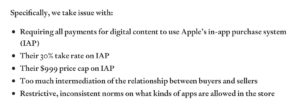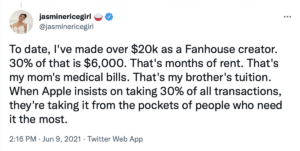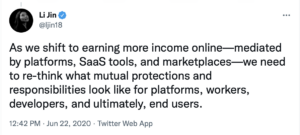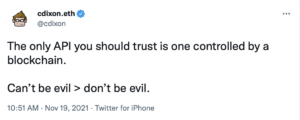Li Jin
Ownership Will Decide the Battle Between Platform and Participant
Originally published on Twitter on June 24, 2021
Let’s stop celebrating creator funds, incremental creator features, and shallow rhetoric about creator empowerment. All of these will fail to solve creators’ economic precarity, so long as we fail to fix the fundamental issue, which is ownership.
Ownership of the means of creation and distribution determines incentives, how wealth is created, who amasses it, and who earns income. Most important of all ownership confers control of one’s destiny: the ability to operate outside of the whims of the select few.
Ownership, therefore, is the original system condition from which all else flows.
The state of content creation today
Without ownership, creators are ultimately enriching and empowering someone else — platform owners — with their work. The value they create is fed back into a system that commoditizes and treats creators as disposable labor.
Leigh Cuen writes about this in her newsletter. “The uncomfortable truth is that most platforms, like many traditional employers, see content creators as expendable. We are a resource they burn through (while hopeful newbies wait in the wings), rather than nurture talent into maturity. So, we need to find ways to make money beyond finite labor.”
When creators use centralized platforms, they produce work that is uploaded to platforms and monetized however the platforms see fit. Platforms’ revenue is sometimes divvied up and distributed to creators — but this is done on the platforms’ terms.
Yes, some creators are earning lots of income (while most earn very little). But, ultimately, in even earning income, creators are creating even more value for the underlying platforms than for themselves, and feeding a flywheel that becomes ever more difficult to disrupt.
Creators, by working, are strengthening platform owners’ dominion over their ability to work.
Giving creators ownership (both economic and political) can address a lot of issues around creator mental health, burnout, and anxiety around income instability. Being creator-friendly stems from ownership.
If politics for the last 150 years was defined by “capital vs. labor,” we are now entering an era of “platform vs. participant.” Rather than being passive platform participants or renters, creators and users should become owners.
Platform vs. participant
This may all sound really out there and abstract. Here’s an example: The boiling point we’ve recently reached around Apple’s 30% cut vs. the creator economy is a prominent instance of how ownership impacts incentives and creates misalignment between owners and developers/creators.
Notably, Apple is majority-owned by institutional investors, with the top three shareholders owning 20% of common stock. The profit-maximizing nature of the App Store is a direct result of the shareholder value model: companies exist to maximize shareholder returns.
Given the company’s goals are to maximize profits, the management team (appointed by shareholders to represent their interests) sets policies that accomplish those goals. Amidst slowing iPhone sales, the strategy is to shift to more service revenue, including via the Apple Store.
Delving deeper, the issues outlined in this essay on how Apple holds back the creator economy are rooted in incentive misalignment between shareholders and platform participants.
Apple Is Holding Back the Creator Economy
But wait. Isn’t the prevailing narrative of Silicon Valley that we live in a positive-sum world where both sides can win? Where Apple’s goals are surely aligned with those of its developers and platform participants?
Sure — if the definition of win-win is that one side wins to the tune of a $2.2 trillion market cap and $16.9 billion in services revenue in the most recent quarter, while the other side sees their already-modest earnings get cut by 30%.
Or where TikTok’s owner Bytedance made $37 billion in 2020 but allocated just 0.9% of that revenue to the TIkTok creator fund. Large-scale creators, like author and scientist Hank Green, are realizing this disconnect.
Imagine how different the incentives would be if Apple’s ownership was different, e.g. if it were owned and self-managed by developers and end users, not just a small group of institutional investors.
Perhaps the 30% take rate would be redistributed to the community. Perhaps there wouldn’t be a 30% take rate at all. Perhaps, instead of a curated, centralized App Store, there could be many App Stores curated by users.
The debate of platform vs. participant isn’t unique to Apple: I foresee an eventual reckoning for every centralized creator platform. What value is generated by creator labor, how is value distributed, and what entitles a platform to unilaterally decide?
If we continue down this path, all creators’ careers will remain at the mercy of a small number of centralized gatekeepers, and there will remain a chasm between how much platforms are worth and how much power they wield, versus how much creators can attain.
Reinstating creator ownership
Ultimately, we have to fix the ownership of these platforms and transition from shareholder capitalism to stakeholder capitalism — taking into account the value created for creators, users, employees, the community, and society at large.
So what does this alternative future look like? Creators need to own the means of production and distribution. We have to turn creators from commoditized labor into “creator-owners”.
A small step in this direction is Atelier Angels, my introductory course on angel investing in social media creators. Through this program, 30 creators have made dozens of angel investments over just the last month, and are well-equipped to evaluate and invest in more.
Companies like Republic, Stonks ,and Cabal are making it easier for retail investors to become equity holders in private companies. The most creator-first startups are actively thinking about how to get more creators and users on their cap tables.
A more exciting, radical development are new online networks that are entirely user-owned and governed: cryptonetworks.
While the worker cooperative is not a new concept, what’s possible now is that cryptonetworks can get past issues that have historically plagued co-ops: access to capital and scalability in the face of complex governance processes. Read more about the shift from co-ops to cryptonetwork from Jesse Walden, who also wrote the playbook on progressive decentralization.
Progressive decentralization is the end goal of these cryptonetworks: exit to the community and decentralize ownership via widespread token distribution. Notably, the path to ownership doesn’t just have to be through purchasing tokens with “capital”, but actually earning them through “labor.”
As a side note, one of the major problems that contributes to growing wealth inequality is that those with capital have more leverage: they can earn more yield than those who are earning only via their labor.
Labor’s share of income — the share of GDP paid out in wages, salaries, and benefits — has been declining in the US since the 1980s. That means that capital’s share of income — interests, profits, dividends, and realized capital gains — is going up. Mechanisms that distribute ownership to those who contribute labor versus just contributing capital can shift that balance.
It’s standard for startups to grant stock options to employees for their work, why not creators and users who are also contributing to the success of the platform?
Looking forward
Here’s a glimpse at what the future might look like. Yield Guide Games is a decentralized autonomous organization (DAO) that invests in and provides workers in developing countries with the assets to make money in various play-to-earn games. Their plan is to decentralize and launch a token that represents governance and ownership in that network so that users have control over its assets and revenue streams.
Mirror, a crypto publishing platform, makes it easier to start media DAOs and route value to collaborators and the broader community. Token holders can also have a say in the operations of the media DAO.
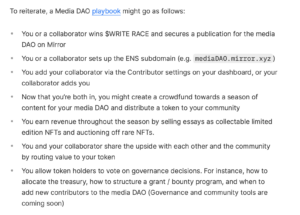
Introducing Media DAOs by Mirror
And given that crypto services are open-source and built on open data, one can imagine there will be many competitors fighting to charge the least rent. If there are 10 competing networks, one could charge 10%, one 9%, one 8%… and the most creator-friendly would accruet more usage.
Because cryptonetworks are user-owned and governed, their incentives are by definition aligned with those of its end users. Ownership can help ensure these networks remain pro-creator.
As Chris Dixon said, “Web2 was don’t be evil. Web3 is can’t be evil.”
In a post about universal creative income, I recently wrote that in the digital age, user rights are civic rights, and creator rights are worker rights. The parallels between online creators and modern workers who lack security and predictability — the “precariat” — are striking.
The opportunity for the next decade is to progress creators into becoming creator-owners (and for all workers to become worker-owners). Only then can creator enablement not just be a marketing campaign, but woven into the fabric of how platforms are designed.
**
Originally published on Twitter on June 24, 2021

